
I've been using it for a few years. Really handy way if avoiding cooperate firewall rules.
I'd go with Girl Fight by Soft Play. Because it's just 10 seconds of shouting and super cool. No one needs to hear what I sound like singing.
Don't have Biden run for reelection. Pick any other half decent human and they should win.
XML is all round better than Json.
How'd you set that up with Opnsense fail over? I have an opnsense VM with input straight from the ISPs FTTP box to the NIC on my server. So I can't fail over to my second proxmox box without swapping the cable over.
I built my website with
fortune, cowsay, toilet, lolcat and aha
Run your own DNS server on your network, such as Unbound or pihole. Setup the overrides so that domain.example.lan resolves to a local IP. Set your upstream DNS to something like 1.1.1.1 to resolve everything else. Set your DHCP to give out the IP of the DNS server so clients will use it
You don't need to add block lists if you don't want.
You can also run a reverse proxy on your lan and configure your DNS so that service1.example.lan and service2.example.lan both point to the same IP. The reverse proxy then redirects the request based on the requested domain name, whether that's on a separate server or on the same server on a different port.
That's fine. You can try learn yourself. I'm just saying it'll be a slower process. The thing with instruments and music in general is that coming in with no knowledge of music theory at all will require a fair bit of work that's much easier if someone explains it to you. Having said that you dont need music theory to just play some tunes. Learn all the open chords, practice switching between them and you'll be able to make your own music soon enough.
I would take a look at Songsterr.com. I use it all the time for playing along with songs where you can read the tab and hear how it should sound.
Remember that you might want to play like Jimmy Page or John 5, but you probably don't want to do what they did to get there. That's the same with anything. You don't see the hours and hours of hard work that went in to being able to play that good. Just stick with it. Set yourself an achievable goal and stick with it.
Get in person lessons. You'll learn more in 2 weeks than in 1 year of trying to teach yourself.
It took me 25 years before I took a lesson and I wish I'd done it sooner.
Come as You Are by Nirvana is a good one to start with.
Your fingers will hurt. That's good. They'll toughen up if you push through it.
I imagine they use it in much the same way as any enterprise. Running servers and workstations, mostly.
F16's run Kubenetes clusters.
Lots of individual bits of hardware on specialized devices will be running embedded operating systems. QNX is big in automotive for the same reasons it'd work on a rocket.
Obviously with IPv6 there's be no need for CGNAT. But NAT within each household or business is useful.
I'd read a lot if people saying how good and easy IPv6 was and I thought I'd use it as an opportunity to learn about it.
But turns out the only thing it does is give everything a public IP because the creators were so obsessed about getting rid of NAT. Nothing else seems to have been thought through.
There are IETF mailing list threads where no one has a clue as to why it's not being adopted, including one where they discover their own RFC is inconsistent with itself and that's the reason why IPv4 is given higher priority than fd00::/8. You can tell how half baked it is when you look at the number of revisions, additional protocols that have been added decades after it was initially proposed.
Their hatred of NAT seems to drive everything, but for most home and business users NAT is a great feature that drives so much simplicity by keeping you private networks private and independent of the rest of the internet.
As someone who worked on a pre-systemd linux system with multiple NICs and needed them all configured automatically from an OS image based on where it was in the rack, I can't stress enough how good deterministic interface names are.
Booting up a system and each time having different names for each NIC was a nightmare.
Frankly 90+% of what systemd has done is tremendously positive and makes linux a better operating system to use, both for sys admins and end users.
I've recently bought some studio monitors to replace a hifi I was using and they didn't come with grilles. Seems to be a difference between studio kit and the hifi world.
Not being predictable by us does not mean they offer free will.
The preconditions are so precise that you'll never be able to get exactly the same results from trying to do the same thing twice - you'll never be able to do the same thing twice. But that doesn't stop cause and effect determining the outcome. There is no place where free will can enter in to any equation at any micro or macroscopic level and just having unpredictable microscopic events doesn't give you control of your own destiny. This is totally separate from your own perceptions of having choices you make. Personally I find myself doing things I didn't consciously choose to do. Once you start noticing them you might find more and more.
I posted this elsewhere a few days ago. I don't think IPv6 can do what I require of a basic home network, let alone a large enterprise...
I gave it a really good shot at implementing this past week. I spent 3 days getting up to speed, reading loads and trying various different things. But I am now back to IPv4 only because I just can't get IPv6 to do what I want and no amount of searching has made me think what I want to do is even possible.
Some background about the IPv4 network I run at home: I run opnsense on a Proxmox server. I have a few services publicly available using port forwarding. I run several VLANs for IoT, VoIP, Cameras etc. I use a bunch of firewall rules that are specific client devices on the network. So for example I have a rule that blocks youtube from the kids tablets and the TV. I have a special rule around DNS for the wife as she doesn't want to use the pihole blocking features. These rules are made possible because the DHCP server is set to give them a fixed IP and I can create a firewall alias and rule based on that.
None of these things on my existing network are particularly difficult to configure, they run really well.
What I want from IPv6 is:
- All devices to use IPv6 including android devices.
- To have the same firewall rules configured and not have them be easily bypassed.
- To use privacy addresses as I don't want to make every device uniquely trackable over the internet.
- To be able to cope with changes to the ISP provided /48 prefix seamlessly.
- Have internal DNS make accessing intranet devices easy.
- To ensure the privacy of individual devices on my network by avoiding individual device tracking.
What I've tried:
- Using DHCPv6, but this excludes android devices. So that's out.
- Using a NAT (to avoid tracking of individual devices) and fd00/8 addresses, but this is pointless as those addresses are lower priority than IPv4 (FFS!)
- SLACC just seems a non-starter.
Additional: I don't think I have a problem with "thinking about it all wrong for IPv6". I may have a skill issue, hence this question.
As far as I can tell to achieve requirement 1) you must use SLAAC. SLAAC without privacy extensions doesn't allow for 6).
Changes to external ISP prefix assignment impacts MY INTERNAL NETWORK (this just seems insane). And as far as I can tell there's no easy way around this, especially if I have static addresses configured for servers which would (if using SLAAC) have to be manually configured.
I can't see how DNS would be updated either, either Unbound running on Opnsense, or to the pihole. If I go for SLAAC with privacy extensions and I keep paying for a static IP (v4 & v6) to my ISP then I can't implement any firewall rules for specific devices as devices will change their IP regularly. And its even worse if I don't pay for a static IPv6 prefix.
I don't think anything I'm trying to do is particularly strange or unusual but 26 years after its introduction I don't see that IPv6 can meet these requirements. And one of the leading firewall routers, especially in the homelab doesn't have answers to these questions either.
Can you suggest a way to meet all 6 requirements I have with IPv6?
No idea about socials, but some will do a DBS check
[Question] IPv6 SLAAC and firewall rules
Given there's been a bit of talk about IPv6 around here recently, I gave it a really good shot at implementing this past week. I spent 3 days getting up to speed, reading loads and trying various different things. But I am now back to IPv4 only because I just can't get IPv6 to do what I want and no amount of searching has made me think what I want to do is even possible.
Some background about the IPv4 network I run at home: I run opnsense on a Proxmox server. I have a few services publicly available using port forwarding. I run several VLANs for IoT, VoIP, Cameras etc. I use a bunch of firewall rules that are specific client devices on the network. So for example I have a rule that blocks youtube from the kids tablets and the TV. I have a special rule around DNS for the wife as she doesn't want to use the pihole blocking features. These rules are made possible because the DHCP server is set to give them a fixed IP and I can create a firewall alias and rule based on that.
None of these things on my existing network are particularly difficult to configure, they run really well.
What I want from IPv6 is:
- All devices to use IPv6 including android devices.
- To have the same firewall rules configured and not have them be easily bypassed.
- To use privacy addresses as I don't want to make every device uniquely trackable over the internet.
- To be able to cope with changes to the ISP provided /48 prefix seamlessly.
- Have internal DNS make accessing intranet devices easy.
- To ensure the privacy of individual devices on my network by avoiding individual device tracking.
What I've tried:
- Using DHCPv6, but this excludes android devices. So that's out.
- Using a NAT (to avoid tracking of individual devices) and fd00/8 addresses, but this is pointless as those addresses are lower priority than IPv4 (FFS!)
- SLACC just seems a non-starter.
Additional: I don't think I have a problem with "thinking about it all wrong for IPv6". I may have a skill issue, hence this question.
As far as I can tell to achieve requirement 1) you must use SLAAC. SLAAC without privacy extensions doesn't allow for 6).
Changes to external ISP prefix assignment impacts MY INTERNAL NETWORK (this just seems insane). And as far as I can tell there's no easy way around this, especially if I have static addresses configured for servers which would (if using SLAAC) have to be manually configured.
I can't see how DNS would be updated either, either Unbound running on Opnsense, or to the pihole. If I go for SLAAC with privacy extensions and I keep paying for a static IP (v4 & v6) to my ISP then I can't implement any firewall rules for specific devices as devices will change their IP regularly. And its even worse if I don't pay for a static IPv6 prefix.
I don't think anything I'm trying to do is particularly strange or unusual but 26 years after its introduction I don't see that IPv6 can meet these requirements. And one of the leading firewall routers, especially in the homelab doesn't have answers to these questions either.
Can you suggest a way to meet all 6 requirements I have with IPv6?
Eastern Ukraine isn't an ideal tourist spot at the moment.
I don't understand it either. On one hand people say don't remember addresses, use DNS and on the other DNS relies on static addresses but then every device is "supposed" to have random addresses via SLAAC or privacy addresses. It just doesn't seem to tie together very well, but if you use them like IPv4 addresses you're apparently doing it wrong.
A what are they putting in the BWT water that's corroding their brains?
Moving to Helix, am I an idiot?
Ok, I've cracked. I have a nice pedal board and I can get some nice sounds from it. But I'm selling almost all of it and moving to Helix. Keeping a rams head muff and blues driver. But the expandability, versatility, simplicity of setup and no need to worry about patch cables, power supplies etc..
Am I going to regret it?
Spent 7 hours trying to fix my iredmail server
I noticed that I wasn't getting many mails (I need better monitoring), and discovered that my iredmail server was poorly.
I have spent far too much time and energy on getting it back and working these past few days, but I've finally got it back up and stable.
Some background: I've had iredmail running for probably going on 6 years now and have had very few issues at all. It runs on an Ubuntu VM on Proxmox and originally was running in the same VM on ESXi (I migrated it over). I haven't changed anything to do with the VM for years other than the Ubuntu LTS updates every 2-3 years, it's always been there and stable. I occasionally will update the Ubuntu OS and iredmail itself, no problems.
Back to the problem... I noticed that Postfix was running OK, but was showing a bunch of errors about clamav not being able to connect. Odd. I then noticed that amavis was not running and had seemed to just die. I couldn't find any reason in any log file. Very strange. Bunch of hunting, checking config file history in the git repo. Nothing significant for years.
Find that restarting the server got everything back up and running. Great, lets go to bed.... Wake up next morning to find that amavis was dead again - it only lasted about 40 mins and then just closed for no reason. Right, ok, time to turn off clamAV as that seemed be be coming up a bit wheilst looking, follow the guide, all is well. Hmm, this seems to be working, but I don't really want clamav off. A whole bunch of duck duck going and I still couldn't figure out a root cause.
And then it clicked, the thing that was causing amavis to close was that it was running out of memory and it was being killed. Bump the memory up to 4GB and re-enable everything as it originally was and.... it seems to have worked. Been going strong for over a day now.
I don't know what it was that's changed recently which has meant the memory requirements have gone up a bit, but at least it's now fixed and it took all of 2 minutes to adjust.
The joys of selfhosting!
What are your top 3 purchases of all time?
There's 3 things that really stand out for me that I would say made a massive difference to my life:
-
Cordless screw driver. Bought the day after building a flat pack bed with a crappy screw.driver that just shredded my hand. Thought it was frivolous at the time, but I've used it so much since. It's light, small enough to fit in my pocket and good for 90% of DIY tasks.
-
Tassimo coffee machine. Bought it 9 years ago, use it every day. Nice quick easy coffee. What's not to like.
-
My first DSLR camera. It was a Nikon D50 back in 2005/6 and it sparked my interest in photography to this day. It gave me a hobby I can take lots of places and do it alone or with others. I never loved the D50 camera itself, but I did get some really nice shots with it
Thank you for the help yesterday. This is the cable I need to fit through a breeze block wall

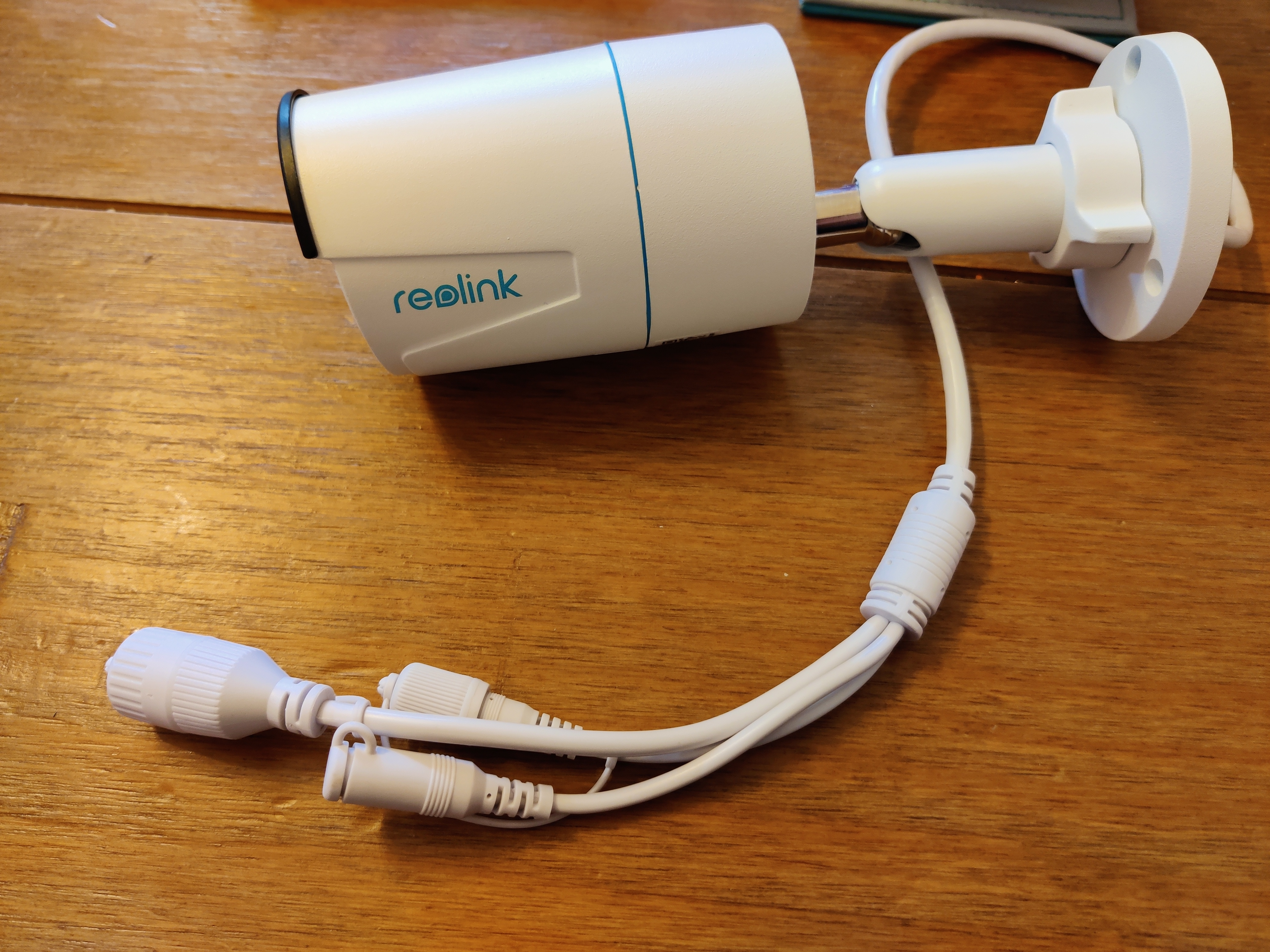
Thank you for the replies yesterday about my drill. I think I'm going to get a cheap corded SDS drill and some big bits. This is what I need to feed through the wall and there is no way to detach the cable from the camera and feed it the other way. I know it needs to be weather shielded, but this is a mad amount of connectors!
Is this a hammer drill?

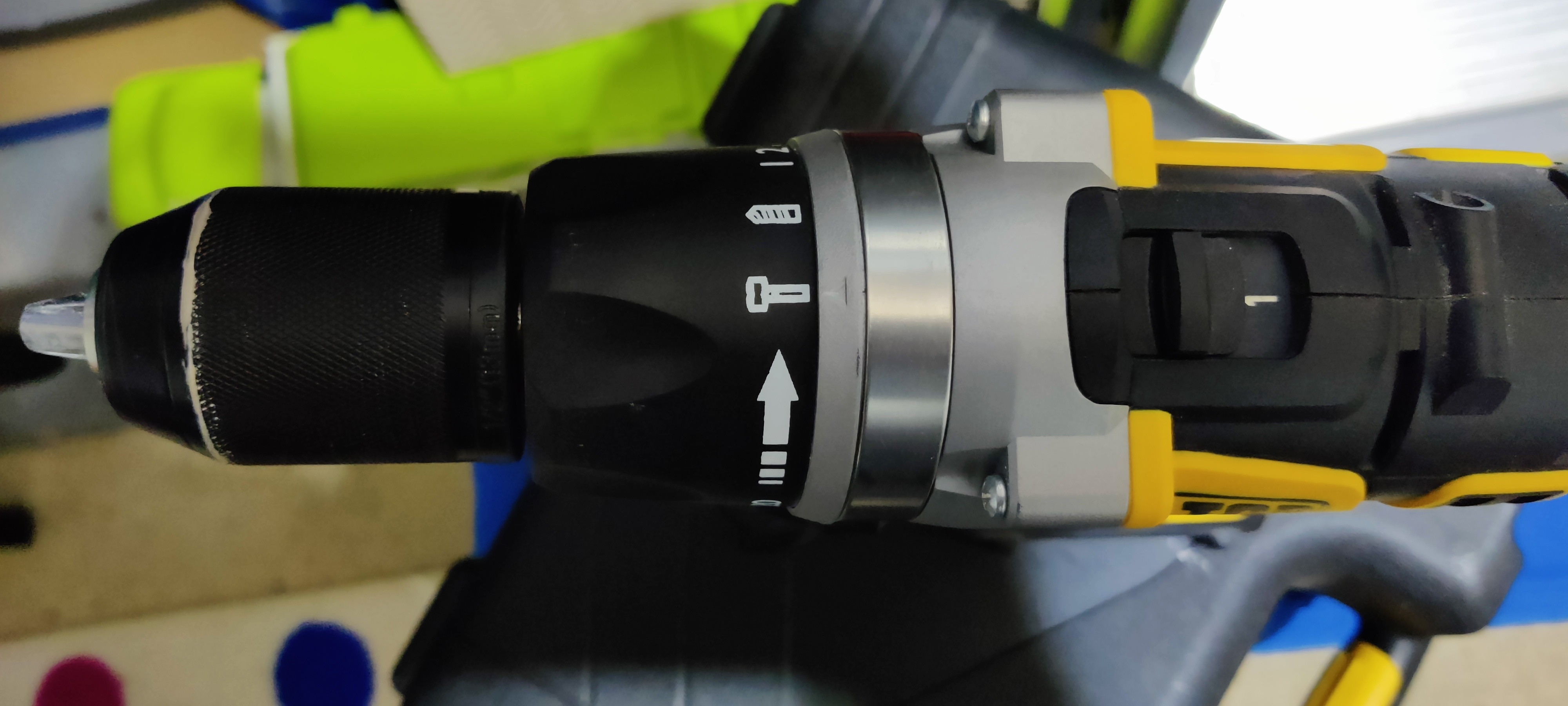
The icon is a little different to what I've seen on others and I don't know how to tell otherwise. I have a job that involves drilling through a breeze block wall about 20cm and I don't want the expense of buying an SDS if I can help it.
This drill was given to me a long time ago, hence not knowing what I have here.
Thanks!
Is this a hammer drill?

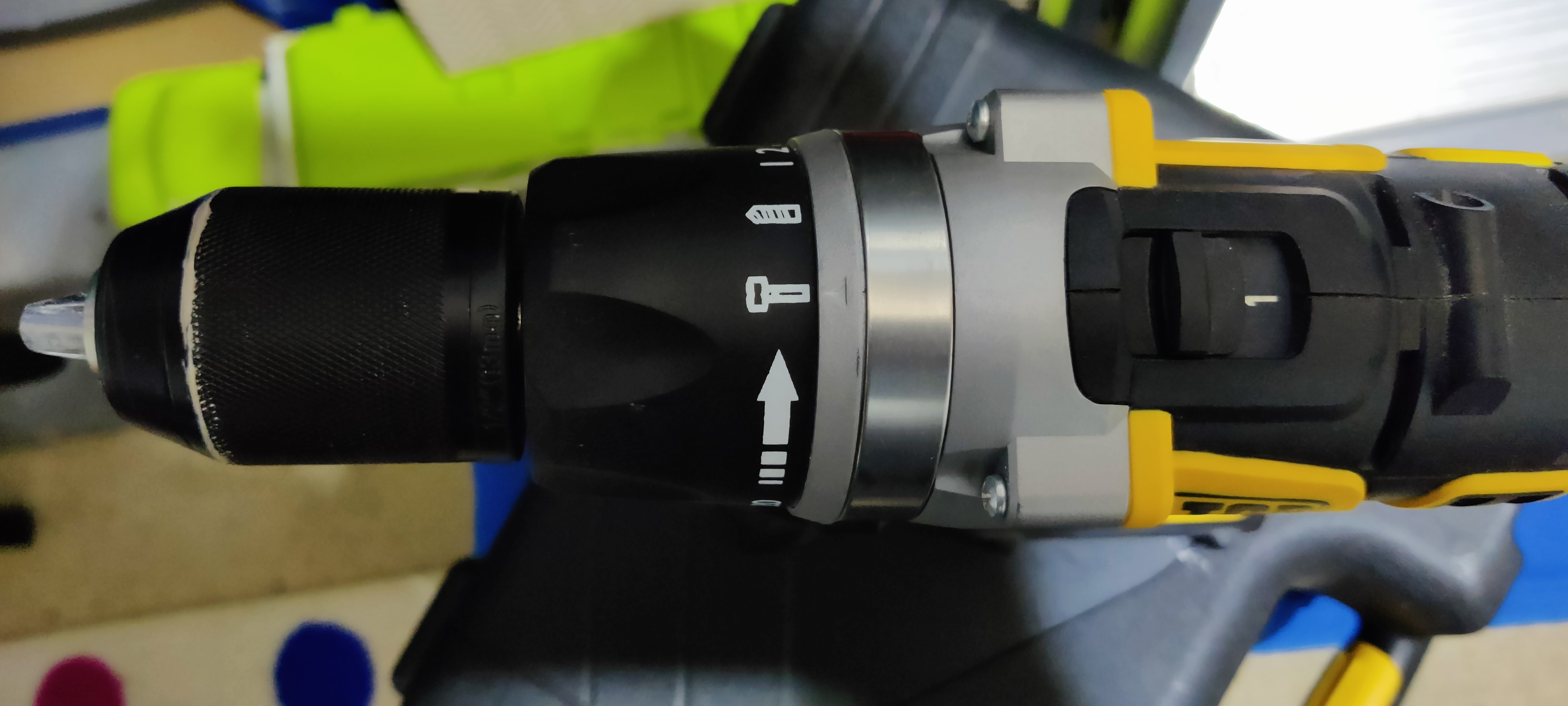
The icon is a little different to what I've seen on others and I don't know how to tell otherwise.
Thanks!
Other than filling with plaster and taking a cast of your bits, what use do you suggest for large glass jars?

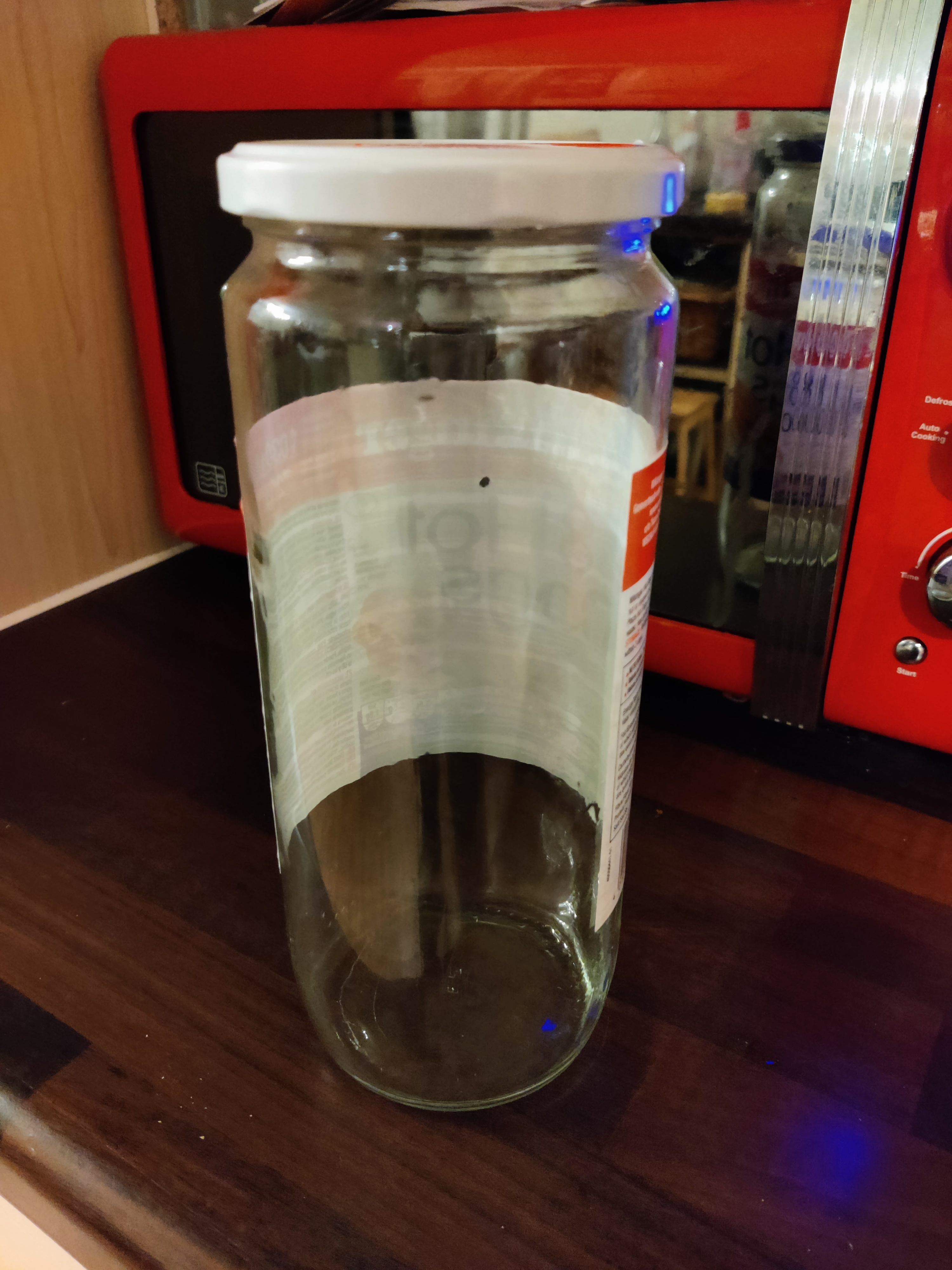
Seems like a shame to throw away and must have a use.
NPD: One Control White Loop

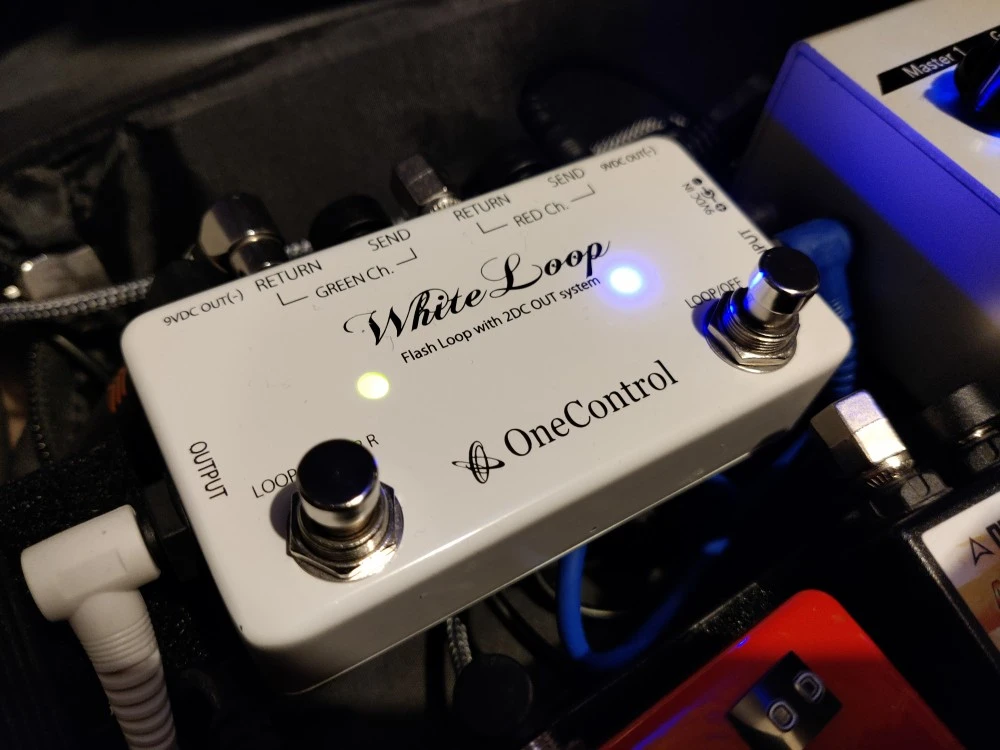
It's not the most exciting pedal in that it's just a clever switch, but I do like the possibilities it gives.
It has two switchable loops. In one loop I have my Diezel VH4-2 working as a preamp and in the other I have my Peavey Classic's pre amp. This allows me to switch between which preamp I want to use whilst also keeping my delay and modulation effects in the FX loop - post preamp.
Guitar goes in to the input. Red loop sends to the VH4 and returns from the VH4 preamp output. Green loop sends to the front of the amp and returns from the FX loop send. That's the two preamp loops. The left switch toggles between each loop and the right switch bypasses both loops, which in my case means I have no preamp as the signal goes straight to the FX return via the delays - so I'll keep the right switch always on.
Then the output of the pedal goes to the modulation and delay pedals and then to the amp's FX return.
Been playing over 25 years and just booked my first ever guitar lesson.
I got my first guitar in about 95 and have been totally self taught. I stagnated massively for around 15 years in the middle when I infrequently played then got frustrated all I could do was some Nirvana power chords.
Started playing again around 5 years ago and had my guitar professionally setup - what a world of difference that made! I've made decent progress since but it's still all just the odd riff or solo here and there and there's a lot I can do a lot better. Using YouTube videos is only getting me so far and some 1 on 1 I hope will do the trick.
My wife started taking piano lessons and it inspired me to do the same for guitar. I'm sure it will be helpful even if they're going to rip my technique up and start again.
Have you had lessons or are you self taught? What helped the most for your playing?
Doing My Duty for all Linux Gamers

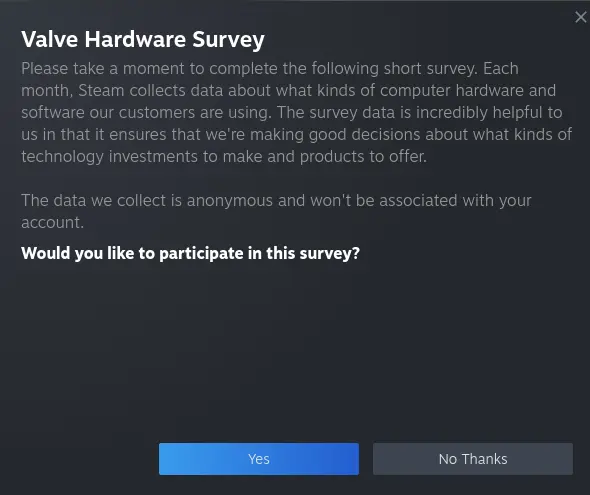
I thought I'd never see the day.
For King Tovalds and Country of FOSS OS's
I wear Arch, btw


Wear Arch, but I run EndeavourOS. If EndeavourOS launched a line of shoes I'd probably wear them.
New Player Strat


A Player strat in black with maple neck. So far I'm pretty impressed. The neck is nice, the back is satin and the fretboard is glossy, but not sticky like I thought it might be. The electrics all seem high quality. Fit and finish all excellent and almost as good as my PRS SE. Came setup with the bridge very floating and the 9 gauge strings old and corroded, but whatever they were coming straight off either way.
I've already modded it to end up with the guitar I really wanted.
New single ply black pickguard, decked the trem, tightened the truss rod, and a new set of GHS Gilmour strings.
Now I'm very happy. I just love looking at it as much as playing it.
PRS SE Custom 24 in Bonnie Pink


Thought I'd share what I think is one of the most beautiful guitars I've seen: my PRS SE Custom 24 in bright Bonnie Pink. The light was catching it quite nice this evening.
This thing plays as good as it looks. The neck is really nice, the frets and edge of fretboard are like butter, the trem is really nice with a push in bar. The high fret access is just superb. I love the pickups that have some great bite, but clean up with volume and tone adjustment. The split coil setting, although not perfect adds a lot of versatility so I dont often want to swap guitars just for some single coils - well, most of the time.
Only criticisms would be I think it should have some with locking tuners, but as a £90 add on I can see why they did it to keep the cost down - having since added them I really like the PRS locking system.
The pickup selector switch I find to be quite out of the way and the trem bar gets in the way if wanting to switch mid song. A LP is hard to beat in this regard.
Overall a definite 9.8/10, very highly recommended.
It's a wonderful time for a refreshing beer


I hope you are all enjoying yourself and easing in to the weekend. And if you're working, I'll save a cold one for you
Upgraded Proxmox 7 to 8
This was a very nerve racking experience as I'd never gone through a major version Proxmox update before and I had spent a lot of time getting everything just so with lots of config around disk and VLANs. The instructions were also a big long page, which never fills me with confidence as it normally means there's a lot of holes to fall in to.
My initial issue was that it says to perform the upgrade with no VM's running, but it requires an internet connection and my router is Opnsense in a VM. Thankfully apt dist-upgrade --download-only, shutdown the Opnsense VM and then apt dist-upgrade did the trick.
A few config files changed and I always hate this part of Debian upgrades, but nothing major or of importance was impacted.
A nervous reboot and everything was back up running the new Proxmox with the new kernel. Surprisingly smooth overall and the most time consuming part by far was backing up my VM's just in case. The upgrade itself including reboot was probably 15 mins, the backups and making sure I was prepared and mentally ready was about an hour.
Compared to upgrading ESXi on old hardware like I was doing last year, it was a breeze.
Highly recommended, would upgrade again.
I setup a Friendica instance earlier in the week. Turns out the DNS queries had increased somewhat dramatically

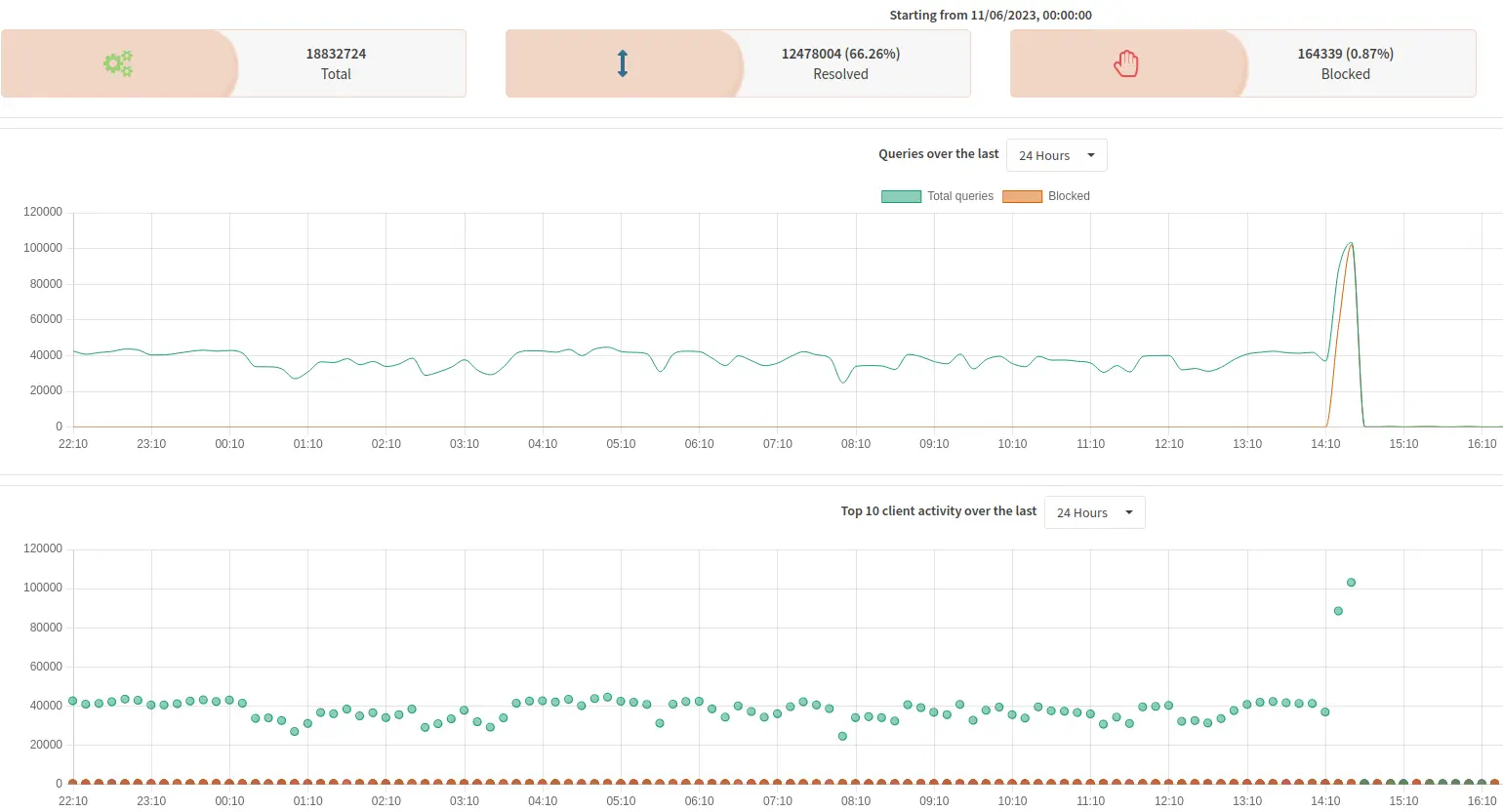
I set up friendica as my first foray on to the fediverse. It worked well, but as it turns out doesn't work that well with Lemmy, which was my main usecase. Well whilst trying to fix DNS issues setting up a Lemmy instance instead, I noticed my DNS logs were rather full. My Unbound DNS was getting 40k requests every 10 mins to *.activitypub-troll.cf. I don't know who or what that is, but blocking it didn't reduce the activity. At first I thought it was something to do with Lemmy as I'd forgotten I still had Friendica running. Thankfully stopping the Friendica service reduced the DNS request back to normal.
So if you've set something up recently, you might want to check if there have been any consequences in your service logs
Current state of the board

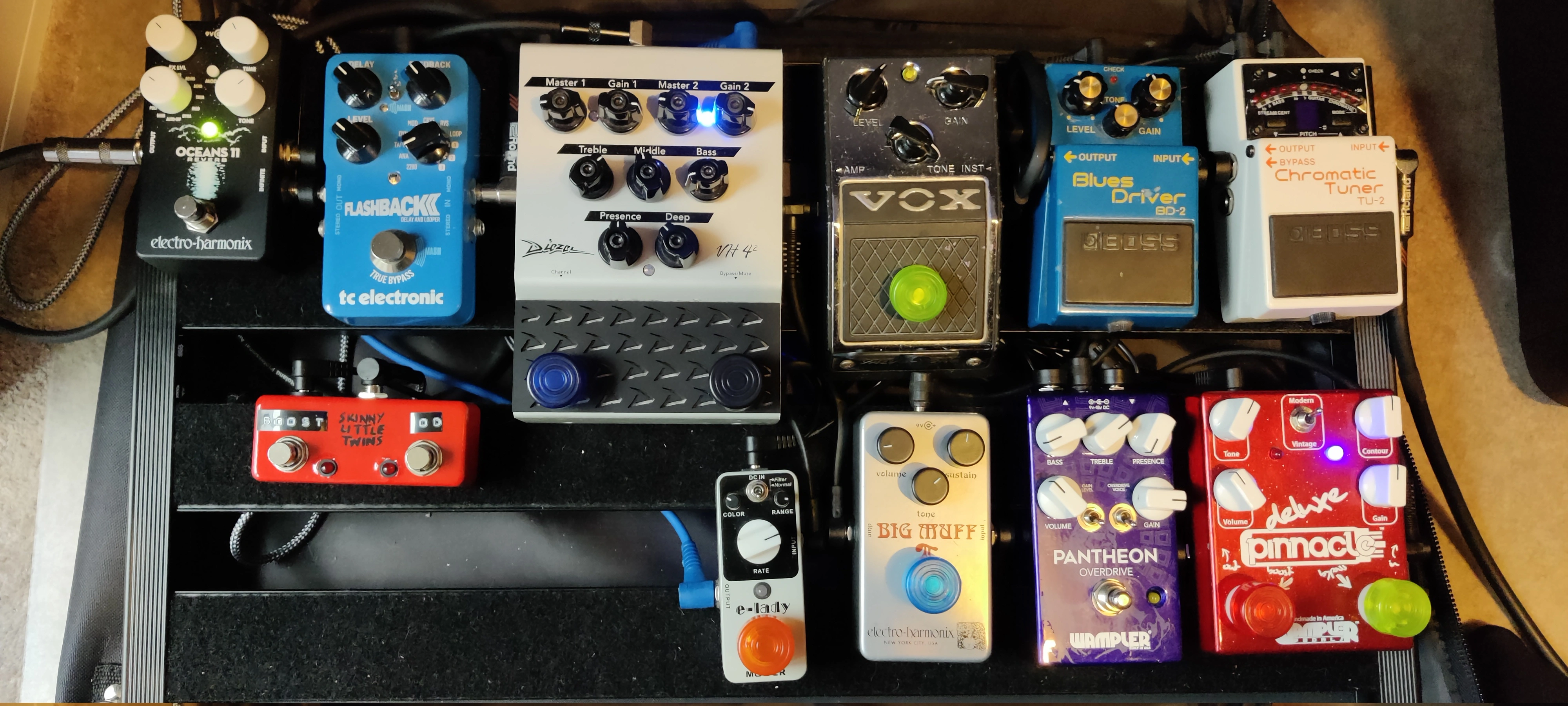
It's been a long time in the making, but this is the happiest I've been with my board for a while.
Signal chain: TU2 -> Blues Driver -> Vox Valvetone -> Diezl VH4-2 -> Wampler Pinnacle Deluxe v1 -> Wampler Pantheon -> EHX Rams Head Big Muff -> Mooer E-Lady -> Front of amp
FX Send -> TC Electronic Flashback 2 -> EHX Oceans 11 -> FX Return.
Running it all in to a Peavey Classic 20 Mini Head and a Harley Benton 1x12 cab with Vintage 30 speakers. The little red pedal is plugged in to the amp to toggle the channels (clean / OD) and the boost (on / off).
Considering it's by far and away the biggest pedal on the board, the VH4-2 probably gets the least amount of use. But what it does is so unique that I'm not getting rid of it.
The Oceans 11 is my most used pedal as it's never off. Otherwise I use the Pinnacle the most. It has such a good tone that reacts to the volume knob on the guitar so well. I find I can do almost any OD / distortion sound I want from it.
The Pantheon, BD2, Valvetone and Rams Head all do their particular thing that the amp and Pinnacle can't. So even though there's a lot of drive pedals here I don't feel like there's much overlap at all. It means I can play Gilmour one minute, then Tool the next, Van Halen another and Clapton another.
Stuff no longer on the board: TC Electronic mojomojo (too similar to other things), Boss DS-2 (not my kind of sound these days), Behringer noise gate (turned out my noise issues were caused by a Boss RC1), Behringer CS400 compressor (I want to like it and maybe I'll put it back on but I haven't been able to get what I want out of it).


